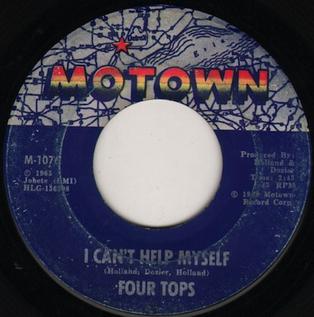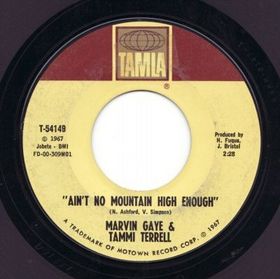Related Research Articles

Mary Esther Wells was an American singer, who helped to define the emerging sound of Motown in the early 1960s.

"Someday We'll Be Together" is a song written by Johnny Bristol, Jackey Beavers, and Harvey Fuqua. It was the last of twelve American number-one pop singles for Diana Ross & the Supremes on the Motown label. Although it was released as the final Supremes song featuring Diana Ross, who left the group for a solo career in January 1970, it was recorded as Ross' first solo single and Supremes members Mary Wilson and Cindy Birdsong do not sing on the recording. Both appear on the B-side, "He's My Sunny Boy".

"Stoned Love" is a 1970 hit single recorded by The Supremes for the Motown label. It was the last Billboard Pop Top Ten hit for the group, peaking at number seven, and their last Billboard number-one R&B hit as well, although the trio continued to score top ten hits in the UK into 1972. In the UK, it was the post-Ross Supremes' biggest hit, reaching number 3 in the singles chart. The single spent six weeks in the UK top ten and five weeks in the US top ten. The BBC ranked "Stoned Love" at number 99 on The Top 100 Digital Motown Chart, which ranks Motown releases solely on their all time UK downloads and streams.

"Ain't Too Proud to Beg" is a 1966 song and hit single by The Temptations for Motown Records' Gordy label, produced by Norman Whitfield and written by Whitfield and Edward Holland Jr. The song peaked at number 13 on the Billboard Pop Chart, and was a number-one hit on the Billboard R&B charts for eight non-consecutive weeks. The song's success, in the wake of the relative underperformance of the previous Temptations single, "Get Ready", resulted in Norman Whitfield replacing Smokey Robinson, producer of "Get Ready", as The Temptations' main producer. In 2004 it finished #94 in AFI's 100 Years...100 Songs poll thanks to its inclusion in The Big Chill soundtrack.
The Mary Jane Girls were an American R&B, soul and funk group that gained popularity in the 1980s. They were protégées of musician Rick James. They are known for their songs "In My House", "All Night Long", "Candy Man", and their cover version of "Walk Like a Man".

"I Can't Help Myself " is a 1965 hit song recorded by the Four Tops for the Motown label.

"Ain't No Mountain High Enough" is a pop/soul song written by Nickolas Ashford & Valerie Simpson in 1966 for the Tamla label, a division of Motown. The composition was first successful as a 1967 hit single recorded by Marvin Gaye and Tammi Terrell, and became a hit again in 1970 when recorded by former Supremes frontwoman Diana Ross. The song became Ross's first solo number-one hit on the Billboard Hot 100 chart and was nominated for the Grammy Award for Best Female Pop Vocal Performance.

"I Want You" is a song written by songwriters Leon Ware and Arthur "T-Boy" Ross and performed by singer Marvin Gaye. It was released as a single in 1976 on his fourteenth studio album of the same name on the Tamla label. The song introduced a change in musical styles for Gaye, who before then had been recording songs with a funk edge. Songs such as this gave him a disco audience thanks to Ware, who produced the song alongside Gaye.
"Since I Lost My Baby" is a 1965 hit single recorded by The Temptations for the Motown Records' Gordy label. Written by Miracles members Smokey Robinson and Pete Moore and produced by Robinson, the song was a top 20 pop single on the Billboard Hot 100 in the United States, on which it peaked at number 17. On Billboard's R&B singles chart, "Since I Lost My Baby" peaked at number four.

"Part-Time Lover" is a single by American R&B singer and songwriter Stevie Wonder, from his 1985 album In Square Circle. The song reached number 1 on the Billboard Hot 100, R&B, dance, and adult contemporary charts, becoming Wonder's final number one hit to date. The song's simultaneous chart successes made Wonder the first artist to score a number-one hit on four different Billboard charts. The song was also released as a special 12" version. Lyrically, it tells the story of a man who is cheating on his wife with a mistress, only to find out in the end that his wife is cheating on him as well.

"Love Machine" is a 1975 single recorded by Motown group The Miracles, taken from their album City of Angels. The song was a #1 Pop smash on the Billboard Hot 100, and the biggest-selling hit single of The Miracles' career. This single was one of two Billboard Hot 100 Top 20 hits recorded by The Miracles with Billy Griffin as lead vocalist; the other is 1973's "Do It Baby". Griffin had replaced Miracles founder Smokey Robinson as lead singer in 1972. The song features a growling vocal by Miracle Bobby Rogers, with group baritone Ronnie White repeating "yeah, baby" throughout the song.

"Neither One of Us " is a song recorded by Gladys Knight & the Pips. Released on December 26, 1972 on Motown's Soul Records imprint as S 35098, it became one of their biggest hit singles to date, and was also the last single the group released prior to them leaving Motown for Buddah Records in February 1973.
"You Beat Me to the Punch" is a soul single by Motown singer Mary Wells, released on the Motown label in 1962. It was co-written by Smokey Robinson of the Miracles, who was responsible for the majority of hits released by Wells - and another Miracles member, Ronnie White - while Wells was a Motown artist.
"Two Lovers" is a single released in 1962 by Mary Wells on the Motown record label. The song was the third consecutive hit to be both written and produced by Smokey Robinson of The Miracles and recorded by Mary Wells, the two previous charters being "The One Who Really Loves You" and "You Beat Me to the Punch." The song's cleverly devised lyrics at first appear to be about a girl singing to one lover who is "sweet and kind" and a second who treats her bad and makes her sad; eventually, the girl reveals that the two lovers are actually the same person. The song became Wells's most successful release to date, reaching #1 on the Billboard R&B chart and #7 on the Billboard pop chart. Its success would be eclipsed two years later by the singer's most successful release ever, the signature tune "My Guy."
"Bye Bye Baby" is the first single by R&B singer Mary Wells, released in September 1960 on the Motown label. The song was one of Motown's earliest hit singles and showcased a much rougher vocal than the singer had during her later years.

"Your Heart Belongs to Me" is a 1962 song written and composed by The Miracles' William "Smokey" Robinson and released as a single by Motown singing group The Supremes during their early years with the label. The song is about a woman whose lover is in the armed forces and has "Gone to a far-away land"; its narration has her tell him to always remember their love for each other if he ever gets lonely.
"Let Me Go the Right Way" is a 1962 song written and produced by then Motown president Berry Gordy and released as a single by Motown singing group The Supremes. It was the group's fourth single and their second charted record following the dismal reception of their first charted single, "Your Heart Belongs to Me".
"When I'm Gone" is a song written by Smokey Robinson and a single he produced twice, one for early Motown star Mary Wells and the other for fellow Motown vocalist Brenda Holloway. Holloway's version became a hit while Wells' was aborted after the singer left the label in 1964.
"Your Old Standby" is a song written by Motown songwriters Smokey Robinson and Janie Bradford and released as a single by Motown star Mary Wells in 1963. The record marked her third top forty pop single to come out in 1963.
"Gigolo" is a dance single written and produced by Fonce and Larry Mizell and released by R&B singer Mary Wells on the Epic Records label. It was the former Motown star's first single with the CBS-operated label and brought Wells brief renewed success on the Billboard chart.
References
- ↑ Use Your Head at Discogs
- ↑ Whitburn, Joel (2004). The Billboard Book of Top 40 Hits, 8th Edition (Billboard Publications).
- ↑ Allmusic review